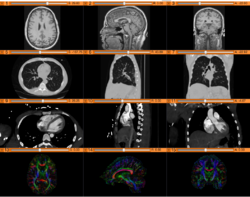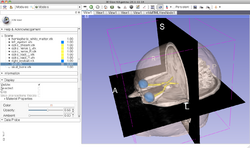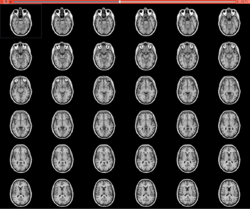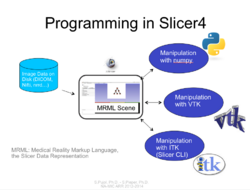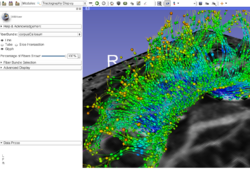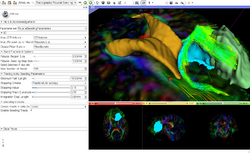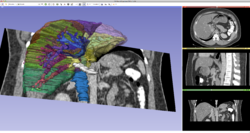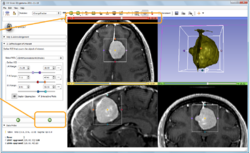Difference between revisions of "Documentation/Nightly/Training"
From Slicer Wiki
| Line 94: | Line 94: | ||
*The [[Media:3DVisualizationDICOMforRadiologyApplications_SoniaPujol_KittShaffer_RSNA2011.pdf | Slicer4RSNA]] course guides through 3D data loading and visualization of DICOM images for Radiology Applications in Slicer4. | *The [[Media:3DVisualizationDICOMforRadiologyApplications_SoniaPujol_KittShaffer_RSNA2011.pdf | Slicer4RSNA]] course guides through 3D data loading and visualization of DICOM images for Radiology Applications in Slicer4. | ||
*Author: Sonia Pujol, Ph.D., Kitt Shaffer, M.D., Ph.D. | *Author: Sonia Pujol, Ph.D., Kitt Shaffer, M.D., Ph.D. | ||
| − | *Audience: Radiologists and users of Slicer who need a more comprehensive overview over Slicer4 visualization capabilities. | + | *Audience: Radiologists and users of Slicer who need a more comprehensive overview over Slicer4 visualization capabilities. |
| + | *Based on: 3D Slicer version 4.0 | ||
*The [[Media:3DVisualizationData RSNA2011 part1.zip | Slicer4RSNAdataset1]] and [[Media:3DVisualizationData RSNA2011 part2.zip | Slicer4RSNAdataset2]] contain a series of MR and CT scans, and 3D models of the brain, lung and liver. | *The [[Media:3DVisualizationData RSNA2011 part1.zip | Slicer4RSNAdataset1]] and [[Media:3DVisualizationData RSNA2011 part2.zip | Slicer4RSNAdataset2]] contain a series of MR and CT scans, and 3D models of the brain, lung and liver. | ||
|align="right"| | |align="right"| | ||
[[Image:Slicer4RSNA_2.png|right|250px|]] | [[Image:Slicer4RSNA_2.png|right|250px|]] | ||
|} | |} | ||
| − | |||
==Slicer4 Quantitative Imaging tutorial== | ==Slicer4 Quantitative Imaging tutorial== | ||
Revision as of 14:49, 6 September 2013
Home < Documentation < Nightly < Training
|
For the latest Slicer documentation, visit the read-the-docs. |
Contents
Introduction: Slicer Nightly Tutorials
- This page contains "How to" tutorials with matched sample data sets. They demonstrate how to use the 3D Slicer environment (version Nightly release) to accomplish certain tasks.
- For tutorials for other versions of Slicer, please visit the Slicer training portal.
- For "reference manual" style documentation, please visit the Slicer Nightly documentation page
- For questions related to the Slicer4 Compendium, please send an e-mail to Sonia Pujol, Ph.D
|
Some of these tutorials are based on older releases of 3D Slicer. The concepts are still useful but bear in mind that some interface elements and features will be different in updated versions. |
General Introduction
Slicer Welcome Tutorial
|
Slicer4Minute Tutorial
|
Slicer4 Data Loading and 3D Visualization
|
Tutorials for software developers
Slicer4 Programming Tutorial
|
Specific functions
Slicer4 Diffusion Tensor Imaging Tutorial
|
Slicer4 Neurosurgical Planning Tutorial
|
Slicer4 3D Visualization of DICOM images for Radiology Applications
|
Slicer4 Quantitative Imaging tutorial
|
Summer 2012 Tutorial contest (under construction)
Automatic Left Atrial Scar Segmenter
|
Qualitative and quantitative comparison of two RT dose distributions
|
Dose accumulation for adaptive radiation therapy
|
WebGL Export
|
OpenIGTLink
|
Additional resources
|
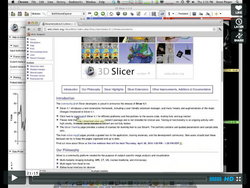
|
|
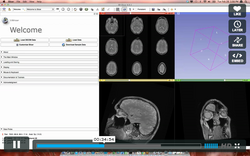
|
|
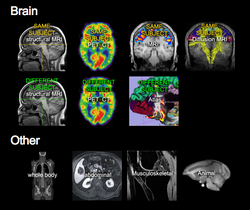
|
External Resources
Using the Editor
This set of tutorials about the use of slicer in paleontology is very well written and provides step-by-step instructions. Even though it covers slicer version 3.4, many of the concepts and techniques have applicability to the new version and to any 3D imaging field:
- Open Source Paleontologist: 3D Slicer: The Tutorial
- Open Source Paleontologist: 3D Slicer: The Tutorial Part II
- Open Source Paleontologist: 3D Slicer: The Tutorial Part III
- Open Source Paleontologist: 3D Slicer: The Tutorial Part IV
- Open Source Paleontologist: 3D Slicer: The Tutorial Part V
- Open Source Paleontologist: 3D Slicer: The Tutorial Part VI
Team Contributions
See the collection of videos on the Kitware vimeo album.
User Contributions
See the User Contributions Page for more content.
